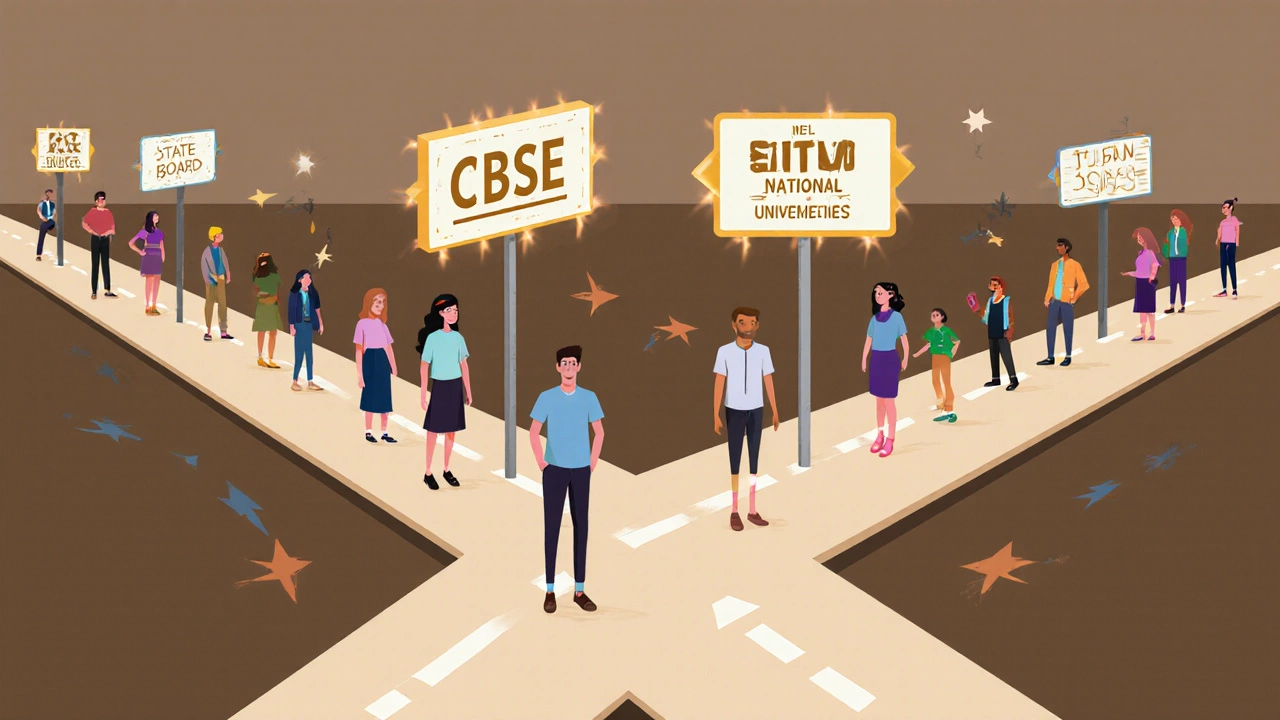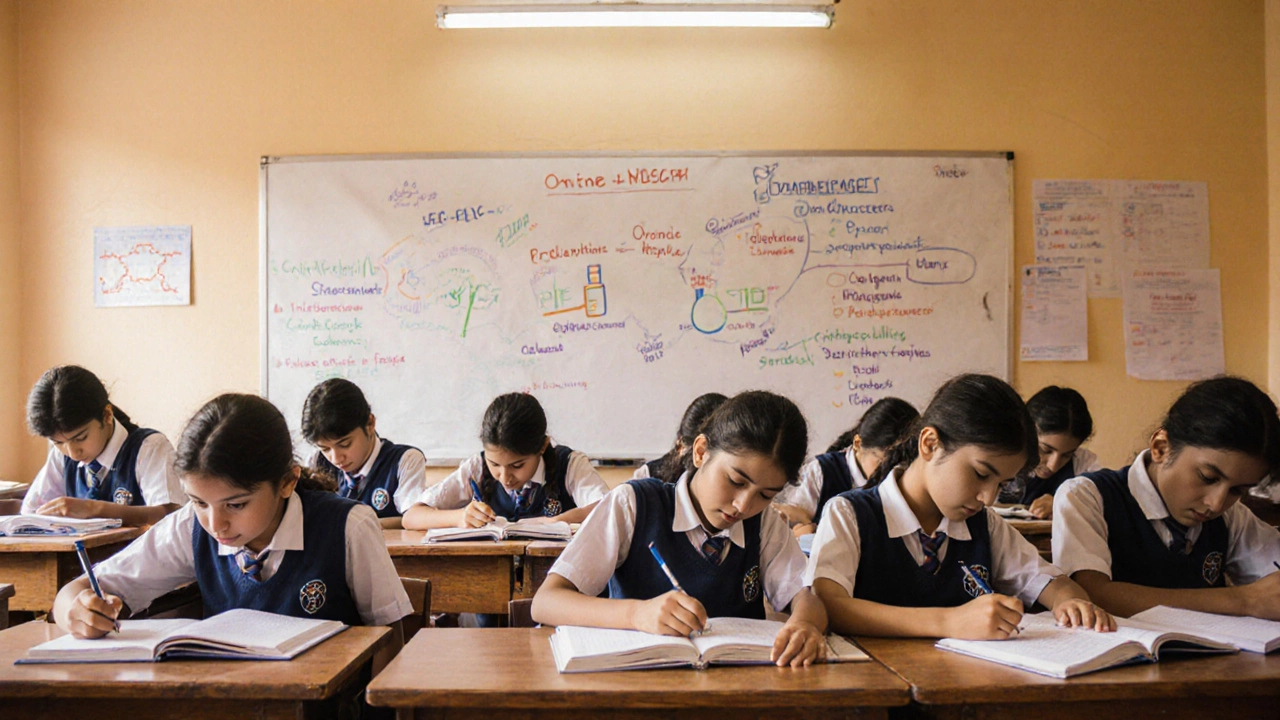Board Value Calculator
Which school board is most valuable for your goals?
Answer a few questions to find the board that aligns best with your educational path
Recommendation
When parents and students in India ask which board has the highest value, they’re not just asking about difficulty-they’re asking which one opens the most doors. The answer isn’t simple, but it’s clear: CBSE holds the most widespread recognition across India and globally. That doesn’t mean other boards are inferior, but CBSE’s structure, reach, and alignment with national exams make it the most valuable for most students.
Why CBSE Is Seen as the Most Valuable
CBSE, or the Central Board of Secondary Education, runs the Class 10 and Class 12 exams for over 20,000 schools across India and in 28 countries. It’s the board used by most Kendriya Vidyalayas, Navodaya Vidyalayas, and private schools in metro and tier-2 cities. Its syllabus is designed with national entrance exams in mind-especially JEE Main, NEET, and CUET. That’s not an accident. CBSE updates its curriculum every few years to match the patterns of these competitive exams. For example, the physics syllabus for Class 12 includes topics like semiconductors and electromagnetic waves that directly appear in JEE. Same with chemistry and biology for NEET.
When a student from a CBSE school applies to IITs, NITs, or AIIMS, admissions officers don’t need to adjust scores or interpret grading systems. CBSE uses a standardized, nationwide marking scheme. Other boards like ICSE or state boards have different weightings, internal assessments, and grading curves. That creates friction. CBSE removes it.
How ICSE Compares
ICSE, or the Council for the Indian School Certificate Examinations, is often called more rigorous. Its syllabus is broader, with heavier emphasis on English, literature, and project-based learning. Students take more subjects-10 instead of CBSE’s 5-6 core ones. That sounds impressive, but it comes with trade-offs.
ICSE doesn’t align as closely with JEE or NEET. A student preparing for IIT from an ICSE school often needs extra coaching to fill gaps in physics or math depth. Also, ICSE exams are more subjective. A 90% in ICSE doesn’t mean the same thing as a 90% in CBSE. Some universities and coaching centers even ask ICSE students to submit additional proof of subject mastery. That’s not a dealbreaker, but it adds steps.
ICSE is great if your child is aiming for liberal arts, international universities, or careers in writing, law, or design. But for engineering, medicine, or government jobs through competitive exams, CBSE is the faster track.
State Boards: Local Strength, National Weakness
State boards like Maharashtra’s SSC, Tamil Nadu’s SSLC, or Uttar Pradesh’s UP Board dominate in their regions. They’re cheaper, more accessible, and deeply tied to local culture and language. But their value drops sharply outside their state.
For example, a student from Bihar’s board who scores 95% might struggle to get into a Delhi university because the syllabus doesn’t match. Admissions committees can’t easily compare a 95% from UP Board to a 92% from CBSE. There’s no national benchmark. Even coaching institutes like Allen or FIITJEE design their crash courses around CBSE patterns. State board students often need 6-8 months of catch-up before they’re ready for JEE prep.
State boards are fine if you plan to stay in your state for college or take state-level exams like MP-PET or WBJEE. But if your child dreams of studying in Bangalore, Pune, or even abroad, CBSE gives you a universal passport.

What About International Boards? IB and IGCSE
Some affluent families choose IB (International Baccalaureate) or IGCSE. These are excellent for students planning to study abroad-especially in the US, UK, Canada, or Australia. They focus on critical thinking, research, and global perspectives. But they’re expensive, rare in India (only about 500 schools offer IB), and don’t help with JEE or NEET.
IB students who want to enter Indian engineering colleges often end up taking JEE as private candidates. The syllabus mismatch is too big. IGCSE doesn’t cover advanced math or physics at the level needed for IIT. So while these boards have high global value, their value within India’s competitive education system is low.
Recognition by Universities and Employers
When you look at top universities, the pattern is consistent. IITs, NITs, IIITs, and AIIMS all use JEE and NEET scores as the primary filter. These exams are designed around CBSE syllabi. Even private universities like Ashoka, OP Jindal, or Symbiosis accept CBSE scores without question. Many state universities still require CBSE certificates as proof of eligibility for lateral entry.
Employers notice this too. In interviews for internships or campus placements, HR teams often ask, “Which board did you study under?” Not to judge, but to estimate preparation level. A CBSE background signals familiarity with exam patterns, time management, and structured learning. That’s not bias-it’s experience.

What If You’re Already on Another Board?
Don’t panic. If your child is in ICSE or a state board, it’s not a dead end. Many top rankers in JEE come from ICSE schools. The difference is effort. You’ll need:
- Extra coaching to bridge syllabus gaps
- Focus on NCERT books-even if your school doesn’t use them
- Practice past JEE/NEET papers to understand the exam style
NCERT textbooks are the real common language of Indian competitive exams. Whether you’re from Kerala or Punjab, if you master NCERT for Classes 11 and 12, you’re 70% ready for JEE. Many ICSE schools now use NCERT alongside their own books. That’s a smart move.
Final Verdict: Value Depends on Goals
There’s no single “best” board. But if your goal is to maximize options-especially for engineering, medicine, or government jobs-CBSE is the most valuable board in India today. It’s the most recognized, the most aligned with national exams, and the easiest to navigate for higher education.
If you’re aiming for arts, humanities, or international universities, ICSE or IB might be better. If you’re staying in your state and taking local exams, your state board is perfectly fine.
But for the broadest path forward, across cities, colleges, and careers, CBSE still leads. It’s not about being harder. It’s about being understood.
Is CBSE easier than ICSE?
CBSE is not necessarily easier, but it’s more focused. Its syllabus is streamlined to match competitive exams like JEE and NEET, so students study fewer subjects in greater depth. ICSE covers more topics broadly, including literature and project work, which can feel heavier. The difficulty depends on what you’re preparing for.
Can a student from a state board crack JEE?
Yes, absolutely. Many top JEE rankers come from state boards. But they usually need to study NCERT textbooks thoroughly, take extra coaching, and practice CBSE-aligned question patterns. The challenge isn’t ability-it’s alignment. State board syllabi often miss key topics tested in JEE, like modern physics or organic chemistry mechanisms.
Does CBSE help with college admissions abroad?
CBSE is accepted worldwide, but it’s not the strongest for international admissions. Universities in the US, UK, and Canada prefer IB or IGCSE because they emphasize critical thinking and research. CBSE students can still get in, but they need strong SAT/ACT scores, extracurriculars, and recommendation letters to stand out.
Which board is better for NEET preparation?
CBSE is the best board for NEET. The biology and chemistry syllabus matches almost perfectly with NEET’s pattern. Most NEET toppers come from CBSE schools. Even NCERT textbooks-used by all NEET aspirants-are designed based on CBSE curriculum. ICSE and state boards require extra revision to cover NEET-specific content.
Should I switch from ICSE to CBSE in Class 9?
Switching is possible, but it’s not always necessary. If your child is already comfortable with ICSE and plans to take competitive exams, focus on supplementing with NCERT books and JEE/NEET practice papers. Switching boards in Class 9 adds stress and might create gaps. Only switch if your school doesn’t support competitive exam prep and you have access to strong CBSE coaching.

